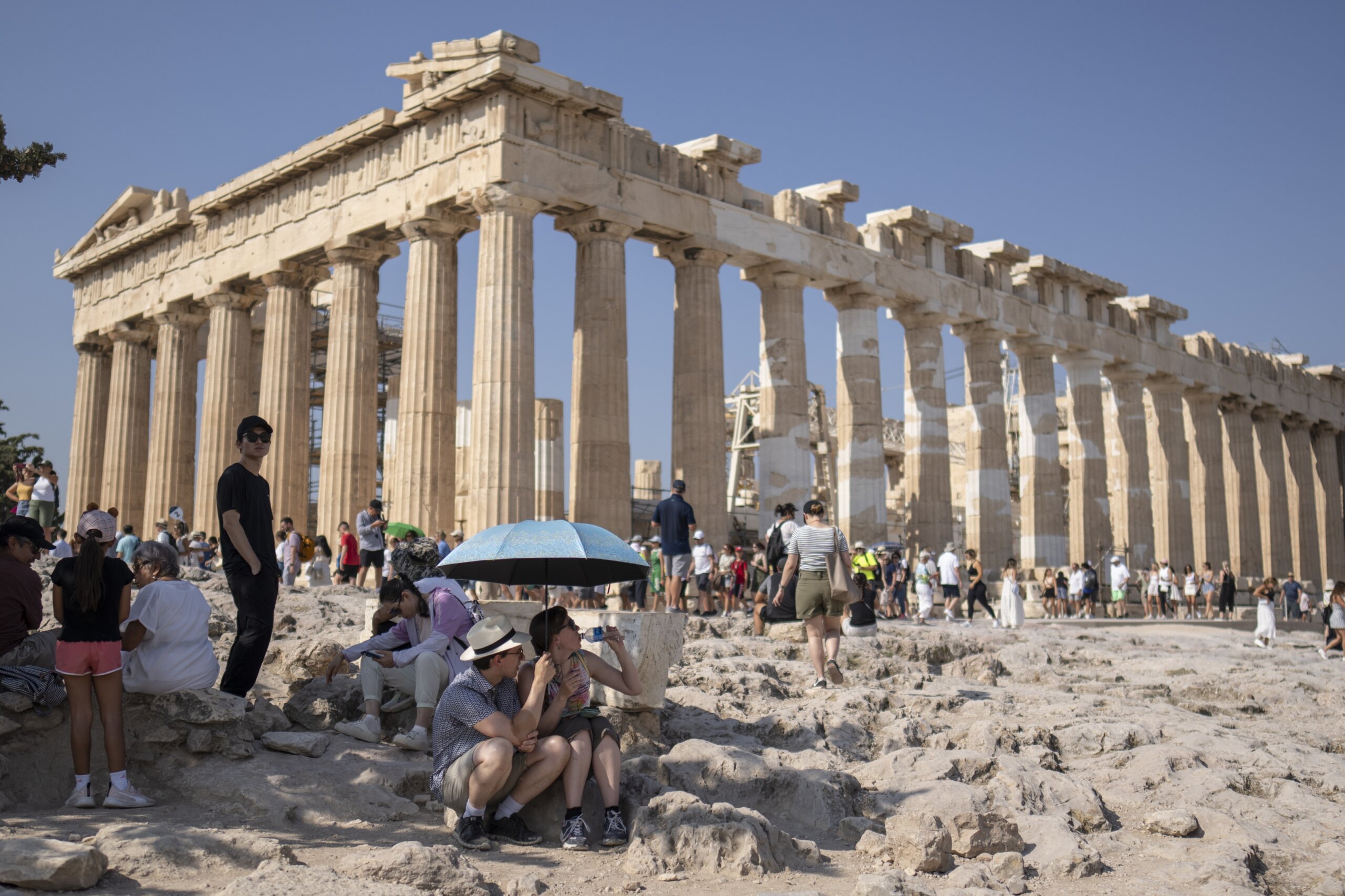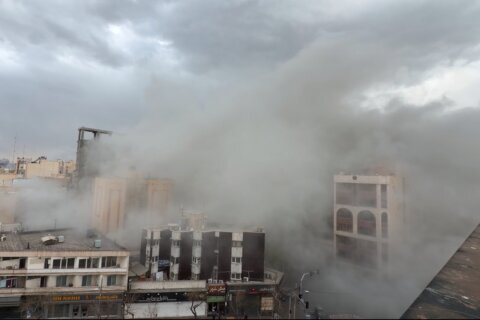Blistering heat, large wildfires and warming oceans from North America across Europe to North Africa have caught hundreds of millions of people in dozens of countries unprepared this year. Experts warn it will only get worse in the short term, even if critical changes are made immediately.
In early June in New York City, midday visibility was reduced just to a few blocks because of thick orange smoke from wildfires in Canada. The haze triggered a rare “Code Purple” air quality alert in Washington, D.C.
In July, the streets in Thessaloniki, Greece’s second largest city, known for ancient monuments, its vivid nightlife, and shopping, were virtually empty in the middle of the day and sometimes even during peak party times at night.
The ruins of the Acropolis, 300 miles to the south in the capital of Athens, were deserted.
Visitors were prohibited from entering the ruins during the blistering midday heat, which has since reopened with hourly and daily caps on visitors.

Even Greeks, familiar with the often oppressive summertime climate, were caught off guard.
“I have never experienced such suffocating heat before,” said Aphrodite Salas, an associate professor of journalism at the Concordia University in Montreal, Canada, visiting Greece to take part in the Thessaloniki International Summer Media Academy (THISAM).
During the most intense heat wave in modern history, temperatures soared well above 100 degrees. The heat index often made it feel like 110 degrees or more.
Salas said the air-conditioned classroom environment at the Digital Transformation and Digital Skills Center in Thessaloniki, where THISAM was held, was a welcome refuge until the sessions ended.
When the doors swung open at the end of the classes, the heat poured in. Participants dreaded getting into their sweltering cars. The stifling air sickened several participants who were also battling jet lag.
“It was relentless, all-encompassing, deeply unsettling,” Salas said.
The fires
As the country melted during the unprecedented heat wave, wildfires devoured centuries-old olive and pistachio groves, expensive island paradises and quiet, picturesque villages.
In late July, more than 80 smaller fires were burning across the country, but seven large blazes raced across the countryside and several islands, killing five and injuring 20.
The most devastated area was the island of Rhodes, where approximately 20,000 tourists had to be rapidly evacuated, striking a significant blow to Greece’s economy.
The prime minister offered evacuees a free week on the island in an attempt to lure them and other skeptics back.
“For all those whose holiday was cut short as a result of wildfires, the Greek government in cooperation with local authorities will offer one week of free holidays on Rhodes next spring, the next fall, so that we make sure they come back to the island and enjoy its natural beauty,” Kyriakos Mitsotakis told ITV’s Good Morning Britain.
But what about next year and the next?
A NASA Land Cover expert suggests that what happened this year in Greece is a harbinger of things to come there and far beyond its borders.
While Greece battled massive fires with help from its European Union neighbors, Spain and Algeria struggled with huge, deadly infernos as well.
“Fires are an integral part of the Mediterranean environment,” said Ioannis Gitas, professor of forest management and remote sensing at the Aristotle University in Thessaloniki. “What we notice in the recent years is an increase in the number of fires per year, as well as an increase in the total area burned.”
Gitas also said it is important that “we notice the appearance of the so-called megafires.”
A megafire, according to the U.S. Interagency Fire Center, is a wildfire that burns more than 100,000 acres of land. Although they’ve been spread out across Greece in 2023, it’s believed that more than 120,000 acres burned in July alone.
Gitas said the impact of “human pressure” on the environment “for thousands of years” is partially responsible for the condition of the landscape.
Population migration trends appear to have had an impact as well, according to Gitas.
“In the recent years,” Gitas said, “the movement of the population to the big cities, for financial reasons, mainly, has resulted in the abandonment of the countryside and of traditional occupations such as beekeeping and resin collection.”
That has had a negative impact on the maintenance of forests and has resulted, according to Gitas, “in higher fuel accumulation in areas that were previously managed by people who practiced those professions.”
Fixing climate change takes time
“The extreme weather which has affected many millions of people in July is unfortunately the harsh reality of climate change and a foretaste of the future,” said Professor Petteri Taalas, secretary-general of the World Meteorological Organization.
“The need to reduce greenhouse gas emissions is more urgent than ever before,” Taalas said. “Climate action is not a luxury, but a must.”
The World Meteorological Organization said in a recent report that climate models predict significant increases in temperature, heavy precipitation and droughts in most land and ocean regions in the coming years. It adds there is a “particularly high risk for the Mediterranean, sub-Saharan Africa and Small Island States.”
Extreme heat and drought initiated by climate change is known to cause wildfires because the dry woods can easily be ignited by lightning strikes, other natural phenomena and human activity.
And if fires happen too frequently, Gitas said, “the forest loses its capability to reproduce itself.” He said it contributes to the degradation of the ecosystem “from high forest to shrubland,” which “can lead to some form of desertification.”
Climate activists like Nikos Panagiotou, a professor of journalism at the Aristotle University and founder of THISAM believes there are multiple approaches to tackle the problem.
“I think that we should actually work on two levels,” Panagiotou said.
The first is proactivity.
“We need to train our societies and even media and journalists in order to report accurately about these events,” Panagiotou said.
Secondly, he said, eliminating disinformation in critical, “because what we have seen in the wildfires, in our case, is disinformation from extremists that actually target people of different religions and ethnic background by falsely accusing immigrant refugees of causing wildfires.”
Turning the clock back on climate change is a stiff challenge: it will take many years, but according to the National Oceanographic and Atmospheric Administration’s website, it is possible.
“If all human emissions of heat-trapping gases were to stop today, Earth’s temperature would continue to rise for a few decades as ocean currents bring excess heat stored in the deep ocean back to the surface,” Panagiotou said. “Once this excess heat radiated out to space, Earth’s temperature would stabilize.”
JJ Green reported from Thessaloniki and Athens, Greece.








